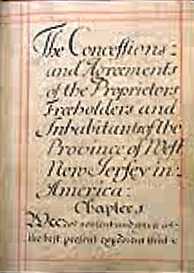Related Topics
Outlaws: Crime in Philadelphia
Even the criminals, the courts and the prisons of this town have a Philadelphia distinctiveness. The underworld has its own version of history.
Philadelphia Legal Scene
The American legal profession grew up in this town, creating institutions and traditions that set the style for everyone else. Boston, New York and Washington have lots of influential lawyers, but Philadelphia shapes the legal profession.
Quakers: The Society of Friends
According to an old Quaker joke, the Holy Trinity consists of the fatherhood of God, the brotherhood of man, and the neighborhood of Philadelphia.
Quakers: William Penn
Although Ben Franklin gets more ink lately, William Penn deserves at least equal rank among the most remarkable men who ever lived.
Quakers: All Alike, All Different
Quaker doctrines emerge from the stories they tell about each other.
..The Constitution
Our Constitution was not a proclamation written by a convention. It was a negotiated contract for uniting thirteen sovereign independent states. Nothing like that had ever been done voluntarily, and few nations have matched it in two hundred years, even with the use of force.
...Trying Out the New Constitution
George Washington's first term as President was much like a continuation of the Constitutional Convention, with many of the same participants.
...Pre-Convention Events
We had a varsity team, but we needed a plan.
..Tax and Fiscal Issues in the Constitution, Morris (1)
For some founding fathers, monetary issues were all that mattered.
..Constitution and Court
Forget all those lawyer jokes you hear. The American legal profession can rightly be proud of the Federal Court System, an achievement of the whole profession. America may be legalistic and overlawyered, but that reflects the rule of law dominated by lawyers. Curiously, the leader of this creation, John Marshall, was not so much a legal theoretician as a relentless Federalist lawyer, determined to reshape the legal profession to be worthy of power.
Slavery and Quakerism
Quakers wanted to free their own slaves peacefully; Bostonians wanted to abolish slavery, punish slaveholders.
Constitution and Civil War
The Thirteenth Amendment abolished slavery (and involuntary servitude, except as punishment for a crime). It was passed by the Senate on April 8, 1864, and by the House on January 31, 1865.
Jury Nullification
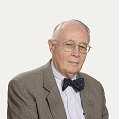 |
| Tom Monteverde |
We must be grateful to the late distinguished litigator, Tom Monteverde, for reminding us of the importance of the jury in American history. Juries seldom realize how much power they can have if they unite on a common purpose. In fact, juries have the implicit right to veto almost anything the rest of government does, by rendering it unenforceable. If the jury opinion is a majority view, nothing but a civil war can legally stop them. So it helped Washington to have jury nullification seem an invincible Quaker idea, while the South trusted a rich slave-owner who had renounced power.
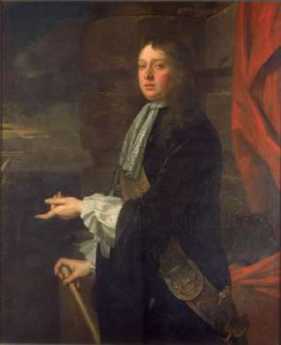 |
| William Penn |
The right to a jury trial originated in the Magna Carta in 1215, but a jury's essentially unlimited power was established four centuries later by Quakers. The legal revolution grew out of the 1670 Hay-market case, where the defendant was William Penn, himself. Penn was accused of the awesome crime of preaching Quakerism to an unlawful assembly, and while he freely admitted his guilt he challenged the righteousness of such a law. The jury refused to convict him. The judge thus faced a defendant who said he was guilty and a jury who said he wasn't. So, the exasperated judge responded -- by putting the jury in jail without food.
The juror Edward Bushell appealed to the Court of Common Pleas, where the problem took on a new dimension. The Justices certainly didn't want juries flouting the law, but nevertheless couldn't condone a jury being punished for its verdict. Chief Justice Vaughn decided that intimidating a jury was worse than extending its powers, so the verdict of Not Guilty was upheld, and Penn was set free. Essentially, Vaughn agreed that any jury that wasn't allowed to acquit was not really a jury. In this way, the legal principle of Jury Nullification of a Law was created. A verdict of not guilty couldn't make William Penn innocent, because he pleaded guilty. A verdict of not guilty, under these circumstances, meant the law had been rejected. Jury nullification thus got to be part of English Common Law, hence ultimately part of the American judicial system.
 |
| Andrew Hamilton |
This piece of common law was a pointed restatement of just who was entitled to make laws in a nation, whether or not nominally it was ruled by a king or a congress. Repeated British evasion of the principles of jury trial became an important reason the American colonists eventually went to war for independence, and probably a better one than some others. The 1735 trial of Peter Zenger was an instance where Andrew Hamilton, the original "Philadelphia Lawyer", convinced a jury that British law, blocking newspapers from criticizing public officials for improper conduct, was too outrageous to deserve enforcement in their court. In that case, jury defiance became even more likely when the judge instructed the annoyed jury that "the truth is no defense". Benjamin Franklin's Pennsylvania Gazette was here quick to come to the side of jury nullification, saying, "If it is not the law, it ought to be law, and will always be law wherever justice prevails." Franklin quickly became allied with Andrew Hamilton, who became Speaker of the Pennsylvania Assembly.
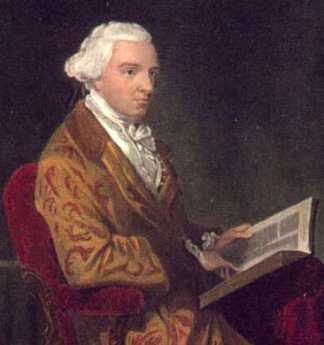 |
| John Hancock |
The Zenger case was often stated to be the origin of the Freedom of the Press in our Constitution fifty years later, but in fact the First Amendment merely provides that Congress shall pass no laws like that. Hamilton had persuaded the Zenger jury they already had the power to stop enforcement of such tyranny, and the First Amendment could be seen as trying to prevent enactment of laws that will foreseeably incite a jury to revolt.
The Navigation Acts of the British government, for example, were predictably offensive to the American colonists, whose randomly chosen representatives on juries were then rendered useless with their wide-spread refusal to convict. This, in turn, provoked the British ministry. John Adams made a particularly famous defense of John Hancock who was being punished with confiscation of his ship and a fine of triple the cargo's value. Adams was later singled out as the only named American rebel the British refused to exempt from hanging if they caught him. As everyone knows, Hancock was the first to step up and sign the Declaration of Independence, because by 1776 there was widespread colonial outrage over the British strategy of transferring cases to the (non-jury) Admiralty Court. Many colonists who privately regarded Hancock as a smuggler were roused to rebellion by the British government thus denying a defendant his right to a jury trial, especially by a jury almost certain not to convict him. To taxation without representation was added the obscenity of enforcement without due process. John Jay, the first Chief Justice of the Supreme Court of the newly created United States, ruled in 1794 that "The Jury has the right to determine the law as well as the facts." And Thomas Jefferson built a whole political party on the right of common people to overturn their government, somewhat softening, it is true, when he grasped where the French Revolution was heading. Jury Nullification then lay fairly dormant for fifty years. But since the founding of the Republic and the reputation of many of the most prominent founders was based on it, there was scarcely need for any emphasis.
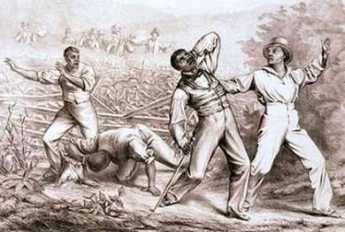 |
| Slave |
And then, the Fugitive Slave Law of 1850 began to sink in. It became evident that juries in the Northern states would routinely refuse to convict anyone under that law, or under the Dred Scott decision, or any other similar mandate of any branch of government. In effect, Northern juries threw down the gauntlet that if you wanted to preserve the right of trial by jury, you had better stop prosecuting those who flouted the Fugitive Slave law. In even broader terms, if you want to preserve a national government, you had better be cautious about strong-arming any impassioned local consensus. A rough translation of that in detail was that no filibuster, no log-rolling, no compromises, no oratory, no threats or other maneuvers in Congress were going to compel Northern juries to enforce slavery within their boundaries of control. All statutes lose some of their majesties when the congressional voting process is intensely examined, and public scrutiny of this law's passage had been particularly searching. Even if Southern congressmen would be successful in passing such laws, it wasn't going to have any effect around here. The leaders of Southern states quickly got a related message, and their own translation of it was, "We have got to declare our independence from this system of government that won't enforce its own laws". If juries can nullify, then states can nullify, and the national union was coming to an end. Both sides disagreed so strongly on this one issue they were willing, for the second time, to risk war for it.
Ku Klux Klan
The idea should be resisted that Jury Nullification is always a good thing. After the Civil War, many of the activities of the Ku Klux Klan were tolerated by sympathetic juries. Many lynch mobs of the Wild, Wild West were encouraged in the name of law and order. Prohibition of alcohol by the Volstead Act was imposed on one part of society by another, and Jury Nullification effectively endorsed rum-running, racketeering, and organized crime. The use of marijuana and abortion are two further examples where disagreement is so strong that compromise eludes us. What is at stake here is protecting the rights of a minority, within a society run by a majority. If minority belief is strong enough, jury nullification issues an unmistakable proclamation: "To proceed farther, means War."
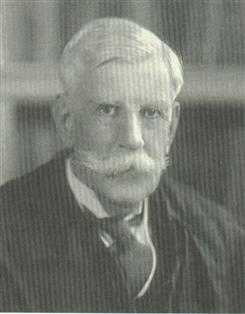 |
| Oliver Wendell Holmes |
That's a somewhat strange outcome for a process started by pacifist Quakers, so the search goes on for a better idea. Distinguished jurists differ on whether to leave things as they are. In a famous exchange, Oliver Wendell Holmes once had dinner with Judge Learned Hand, who on parting extended a lawyer jocularity, "Do justice, Sir, do justice." To which, Holmes then made the somewhat surly response, "That is not my job. My job is to apply the law."
Thus lacking any better approach, it is hard to blame the US Supreme Court for deciding this was something best left unmentioned any more than absolutely necessary. The signal which Justice Harlan gave in the majority opinion on the 1895 Sparf case was the very narrow ruling that a case may not be appealed, solely on the basis that the trial jury was not informed of its right to nullify the law in question. Encouraged by this vague hint, what has evolved has been a growing requirement that incoming jurors take an oath "to uphold the law", officers of the court (ie lawyers)are discouraged from informing a jury of its true power to nullify laws, and Judges are required to inform the jury in their charge that they are to "take the law as the judge lays it down" (ie leave appeals to higher courts). If a jury feels so strongly that it then persists in spite of those restraints, well, you apparently can't stop them. Nobody thinks this is a perfect solution, and aggrieved defendants like the Vietnam War protesters are quite vocal in their belief that the U.S. Supreme Court finally emerged with a visibly asinine principle: a jury does indeed have the right to nullify, but only as long as that jury is unaware it has that right. That's almost an open invitation to perjury if accurate; but while it's not precisely accurate, it comes close to being substantially true.
That's where matters stand, and apparently will stand, until someone finds better arguments than those of Benjamin Franklin, John Jay, Andrew Hamilton -- and William Penn.
Originally published: Monday, June 26, 2006; most-recently modified: Thursday, July 25, 2019
